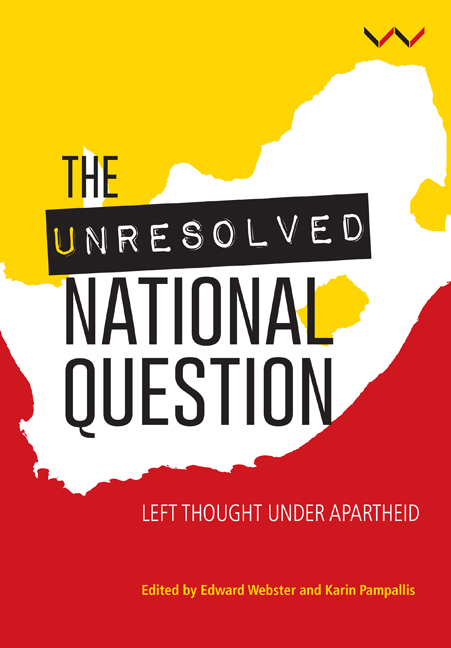Book contents
- Frontmatter
- Contents
- Acronyms and Abbreviations
- Preface: Edward Webster and Karin Pampallis
- Introduction: Revisiting the National Question
- PART ONE KEY FOUNDATIONAL TRADITIONS
- Chapter 1 Decentring the Question of Race: Critical Reflections on Colonialism of a Special Type
- Chapter 2 The African National Congress: Social Democratic Thinking and the Good Society, 1940–1962
- Chapter 3 Oliver Tambo and the National Question
- Chapter 4 The Unity Movement and the National Question
- Chapter 5 The Africanist Turn in South African National Question Discourses
- PART TWO CONTINUITY AND RUPTURE
- Biographical Notes
- Index
Chapter 5 - The Africanist Turn in South African National Question Discourses
from PART ONE - KEY FOUNDATIONAL TRADITIONS
Published online by Cambridge University Press: 21 April 2018
- Frontmatter
- Contents
- Acronyms and Abbreviations
- Preface: Edward Webster and Karin Pampallis
- Introduction: Revisiting the National Question
- PART ONE KEY FOUNDATIONAL TRADITIONS
- Chapter 1 Decentring the Question of Race: Critical Reflections on Colonialism of a Special Type
- Chapter 2 The African National Congress: Social Democratic Thinking and the Good Society, 1940–1962
- Chapter 3 Oliver Tambo and the National Question
- Chapter 4 The Unity Movement and the National Question
- Chapter 5 The Africanist Turn in South African National Question Discourses
- PART TWO CONTINUITY AND RUPTURE
- Biographical Notes
- Index
Summary
The basic factor which assures their [Africans’] regeneration resides in the awakened race-consciousness. This gives them a clear perception of their elemental needs and of their undeveloped potential. It therefore must lead them to the attainment of that higher and advanced standard of life (Pixley ka Isaka Seme, 1906: n.p.).
We, however, move from the deeply held conviction that the people of Africa share a common destiny and must therefore, at all times, seek to address their challenges in a concerted manner, as a united force (Thabo Mbeki, 1998: 198–9).
Our contention is that South Africa is an integral part of the indivisible whole that is Afrika. She cannot solve her problem in isolation from and with utter disregard of the rest of the continent (Robert Sobukwe, 1959a: n.p.).
INTRODUCTION
In his address to the inaugural meeting of the Pan Africanist Congress in 1959, founding president Robert Mangaliso Sobukwe posed what would be central questions for Africanists in South Africa, questions that link them to Africanists throughout the continent and beyond. He asked:
In the course of the past two years we have seen man breaking asunder, with dramatic suddenness, the chains that have bound his mind, solving problems which for ages have been regarded as sacrilege even to attempt to solve … The question then arises, where does Africa fit into this picture and where, particularly, do we African nationalists, we Africanists in South Africa, fit in? (Sobukwe, 1959a).
Sobukwe was observing changes taking place in the world in the middle of the twentieth century, following two terrible wars that had devastated physical infrastructure, human lives and the dream of a better world. He observed the massive changes taking place then as pregnant with many possibilities for Africa's dream of a new world, a world for all. Pixley ka Isaka Seme's 1906 essay also speaks of hope for the birth of a new civilisation, one that would have Africa at the centre. Thabo Mbeki writes in 1998, at the dawn of a new millennium, another time of great changes in the world, a period in which it seemed timely to pose the question whether the twenty-first century would indeed be an African century. There are many Africanist voices in-between and after the three that I highlight in this chapter.
- Type
- Chapter
- Information
- The Unresolved National Question in South AfricaLeft Thought Under Apartheid, pp. 96 - 110Publisher: Wits University PressPrint publication year: 2017



